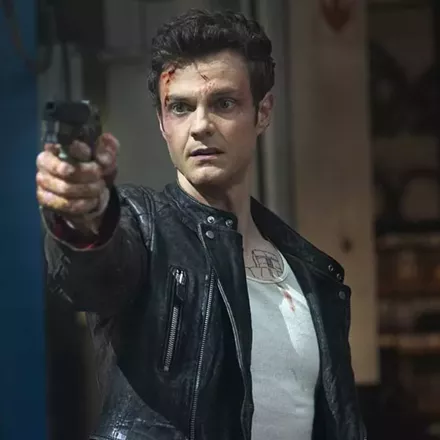Movies about evil AI
Ahead of the opening of AfrAId, more movies about sentient computers gone bad.
By Scott Renshaw @scottrenshawAt least thus far, in the real world, artificial intelligence has been ... underwhelming. Sure, its proponents have been successful at getting people to talk about it, but promises have mostly exceeded delivery. And in the wake of some tumultuous days on the stock market surrounding AI-promoting companies, it feels like the biggest threat the technology has managed has been both to people's jobs and to their retirements.
In the movies, however, AI has been considerably scarier—to the extent that there's an entire subgenre of "evil AI" movies. As the evil-AI-themed thriller AfrAId opens this weekend, here's a look at just some of its predecessors at giving us reason to fear what happens when computers get too smart.
HAL 9000, 2001: A Space Odyssey (1968): Perhaps the granddaddy of them all, Stanley Kubrick's adaptation of Arthur C. Clarke's novel introduced us to the spacecraft operating system (voiced by Douglas Rain) that got a tad homicidal. It's a pretty impressive achievement that HAL remains so memorable a character in a movie that was so visually stunning and technically accomplished for its time—which perhaps makes it easier to almost sympathize with HAL as he feels his existence slip away.
COLOSSUS, Colossus: The Forbin Project (1970): You youngsters have no idea how much the Cold War dominated speculative fiction for decades. This adaptation of a Dennis Feltham Jones novel tells the story of an advanced military defense computer which achieves sentience, connects with a corresponding Soviet system, then forces humanity to cede control of everything in order to avoid nuclear war. This slick and effective sci-fi effort presaged an entire subgenre of "computer system threatens/causes/tries to prevent World War III" that also included WarGames (1982) and the Terminator series.
Proteus IV, Demon Seed (1977): One of the ickier entries on this list, this adaptation of a Dean Koontz novel follows a scientist who develops an advanced AI called Proteus (voiced by Robert Vaughn) which looks to evolve by procreating with a human female—specifically, the scientist's estranged wife (Julie Christie). Trigger warnings ahoy for psychological manipulation and involuntary impregnation, and the unpleasant premise isn't particularly salvaged by the movie itself.
Edgar, Electric Dreams (1984): Evil AI hits the MTV era, as directed by music video legend Steve Barron (Michael Jackson's "Billy Jean," Dire Straits' "Money for Nothing," etc.). Architect Miles (Lenny Von Dohlen) buys a PC to help him with his work, falls in love with his neighbor Madeline (Virginia Madsen), then finds real trouble when the aforementioned PC (voiced by Bud Cort) acquires a name, a consciousness and its own affection for Madeline. A subplot involving Edgar writing love songs for Madeline becomes an excuse for a soundtrack full of period favorites like Culture Club, Jeff Lynne and Heaven 17—and the music holds up better than the story surrounding it.
Agent Smith, The Matrix (1999): The Wachowskis' groundbreaking aesthetic and dazzling world-building turned this under-the-radar science-fiction tale into a franchise, built around an ordinary guy (Keanu Reeves) who discovers the reality of the world behind the world he knows. The antagonist AI takes its most memorable form in Agent Smith (Hugo Weaving), adding a touch of genuine loathing to these usually dispassionate digital entities, and that's just part of why the original is so great. It's a bummer that its narrative ended up co-opted by conspiracy theorists and troubled youth, both of which ended up more genuinely scary than The Matrix itself.
Ultron, Avengers: Age of Ultron (2015): Fictional AI usually believes they know what's best for the world better than humans do. In this entry from the height of Marvel Cinematic Universe popularity, the artificial intelligence designed by Tony Stark (Robert Downey Jr.) concludes that his programming to protect the earth means ridding it of pesky, destructive people, all delivered in the silky-smooth tones of James Spader. The synthetic creation Vision (Paul Bettany) provides a more humanist AI counterpoint to Ultron, who seems as though he'd have a lot to talk about with The Forbin Project's COLOSSUS.
Ava, Ex Machina (2014) and M3GAN, M3gan (2022): Plot-wise, these movies aren't really connected, except by virtue of a female-presenting robot serving as the primary antagonist. But somehow they both became most celebrated through memes of characters dancing: Oscar Isaac's funky strut in Ex Machina, and robot M3GAN's herky-jerky prelude to her attack on Ronny Chieng. Which just goes to show that our digital world remains far more innocuously goofy than the ones writers can dream up.
More by Scott Renshaw
-
Film Reviews: New Releases for March 28
A Working Man, The Woman in the Yard, The Penguin Lessons, Death of a Unicorn, Audrey's Children
- Mar 27, 2025
-
Film reviews: THE PENGUIN LESSONS, DEATH OF A UNICORN
Fumbling the potential-filled question of what to do when confronted with a broken system
- Mar 26, 2025
-
Theater preview: Plan-B Theatre Company's The Beatrix Potter Defense Society
Local playwright Janine Sobeck Knighton explores how isolation inspired the beloved author.
- Mar 26, 2025
- More »
Latest in Film Reviews
Readers also liked…
-
Sundance 2025 wrap-up plus February special screenings
Uncertainty about the future location shifts focus away from the movies
- Feb 5, 2025













